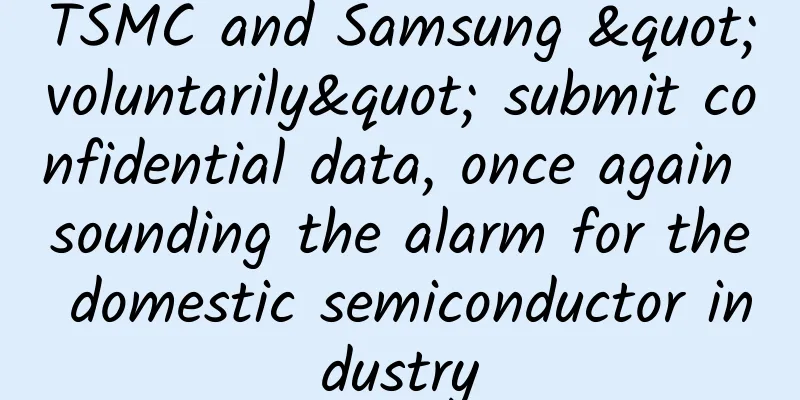TSMC and Samsung "voluntarily" submit confidential data, once again sounding the alarm for the domestic semiconductor industry

|
This year, there has been a global chip shortage, especially in the automotive industry. Take the United States as an example. In September this year, six General Motors factories were shut down, and Ford also limited the production capacity of some models. At present, this impact has also spread to many high-tech manufacturing industries, and has brought "complications" such as increased unemployment and stagnant economic growth. Faced with such a situation, no country would sit idly by. The solution given by the United States is very simple and crude: in late September, the U.S. Department of Commerce required semiconductor manufacturers such as Samsung, TSMC, and Intel, technology companies such as Apple and Microsoft, and more than 20 chip companies such as BMW and Daimler to provide relevant commercial confidential data in order to grasp the real supply and demand relationship in the industry, and set the deadline as November 8. The incident naturally caused strong dissatisfaction among related companies. Samsung and TSMC protested, but the response of US Commerce Secretary Raimondo was very direct: "If companies are unwilling to submit, there are other ways in our (policy) toolbox to get them to hand over their data to us. I hope we don't get to that point, but we will take action if necessary." Under the pressure of the United States, TSMC, Samsung, Hynix and other companies compromised and "voluntarily" submitted chip supply chain information to the US government on November 8. Although many companies said that they did not disclose specific data involving core content such as customer information, inventory and sales, only the parties involved know how credible this statement is. A thorough investigation into hoarding or other motives?In the official documents of the US government, it is stated that the purpose of requiring major companies to hand over data is to "clarify the locations of possible bottlenecks in the supply chain and improve trust and transparency within the supply chain." Simply put, the US government suspects that some companies are hoarding goods, so they need to investigate which parts are actually out of stock and integrate the supply chain accordingly. Raymondo also cited data from the Semiconductor Industry Association: chip manufacturers' production has increased by 8% since the beginning of 2020, and is expected to increase by 16% by the end of next year. However, against this backdrop, there is such a severe shortage that it is hard not to suspect that chip manufacturers are interfering. This may also explain why Korean companies such as Samsung and Hynix are more resistant to the US government's requirement than TSMC: while American automakers are hit hard by chip shortages, Korean automakers are significantly less affected. In September this year, Kia's sales in the United States reached 52,906 vehicles, and the total sales in the first three quarters of this year reached 555,525 vehicles, setting a new record. Therefore, whether Samsung, Hynix and other companies have "favored" domestic car companies has become a topic worth discussing. But apart from the nominal coordination of the supply chain, this move is more based on considerations of practical interests. Today, the U.S. economy has obvious problems, and employment is a good way to solve economic problems. In April this year, U.S. President Biden proposed a plan to "return the chip industry to the United States", and Raymondo also said that "the proportion of high-end chips made in the United States is 0%." The return of the chip manufacturing industry can provide countless jobs for the United States, and can also help them consolidate their dominance in technology, which naturally became a life-saving straw in the eyes of the U.S. government. Last year, the United States used government subsidies to attract TSMC to build a factory in Arizona, and Samsung also confirmed that it would build a factory in the United States. If these two factories can be successfully built, it will have many benefits for the United States' employment and control over high-end manufacturing. However, the subsidies promised by the US government to TSMC have not yet been implemented, and the factory is only in the groundbreaking stage and is not expected to start production until 2024. Building more chip factories is a long-term measure that takes a long time to take effect and cannot alleviate the urgent need. Therefore, the US government only gave chip manufacturers less than two months to consider. After the U.S. government has obtained important data from TSMC and Samsung, it naturally has more say in front of these companies. Combined with the current chip shortage, the U.S. government may require these companies to give priority to meeting the chip needs of American customers, and the next step may be to require technology transfer and patent openness. This series of "open robbery" acts is not without trace. In the 1980s, Japan's semiconductor industry dominated the world, with a market share of over 45%. Subsequently, the US government determined that Japanese semiconductors constituted "dumping" and initiated sanctions, signing the "US-Japan Semiconductor Agreement", requiring Japan to open its semiconductor market and allow foreign companies to obtain more than 20% of the Japanese market share within 5 years, and imposed a 100% punitive tariff on semiconductor products worth US$300 million exported from Japan. A series of measures have put Japan's semiconductor industry in a completely passive position, while the semiconductor industries in South Korea and Taiwan Province of my country have risen rapidly with the support of the United States. Today, similar situations have befallen South Korea and Taiwan. In the worst case, the U.S. government can obtain key information such as the chip design level of companies in various countries, the inventory of these companies' past products and future production, and the technical level of various semiconductor foundries. Once they share this information with major American semiconductor buyers such as Apple, Tesla, and Qualcomm, it means that the bargaining power of Samsung and TSMC when facing these companies will hit rock bottom, and they will have no secrets when facing direct competitors such as Intel and GlobalFoundries. For commercial companies, this situation is undoubtedly a disaster. Japanese scholar Akamatsu Kaname once proposed the "flying geese theory": a certain industry will rise and fall in different countries as the industry transfers. South Korea and Taiwan rose to prominence by relying on the semiconductor industry transferred from Japan, and now they are following Japan's old path. This confirms the "flying geese theory" from a certain perspective. Is the real intention China?Against the backdrop of Sino-US competition, it is hard to say that this US move has no intention of targeting China. Today, China is at a critical stage of its transformation to high-tech, and the demand for chips is quite large. The US government has the customer procurement information of all semiconductor manufacturers in the world, which naturally includes a large number of Chinese manufacturers. Chips are generally booked one to two years in advance, which means that the United States can fully understand the technological development of Chinese companies and may even take sanctions when necessary, just like it did to Huawei. Huawei can design chips independently but cannot manufacture them, while TSMC is just the opposite. Now both companies are strangled by the United States. For China, this is another reminder: in the field of high technology, we cannot rely entirely on foreign imports or even handouts. From design to manufacturing, we must have the ability to solve problems on our own. So we can see that China has been vigorously developing the chip industry in recent years. In addition to Huawei, many companies have also invested in the research and development of self-developed chips in the fields of autonomous driving and artificial intelligence. In the field of chip packaging, domestically produced 28nm and 14nm chips are also expected to be mass-produced this year and next. Although this is not the most advanced chip in the current process, it can already meet the needs of the automotive industry, which is most short of chips. At present, China has a comprehensive layout in talent cultivation, industrial chain completion, core technology breakthroughs and other directions, in order to open up new tracks and seize the initiative when new chips reshuffle the industry. In fact, the US "chip repatriation" plan still has obvious loopholes: although chips are indispensable to the technology industry, no one will buy only one chip to take home, and the chip is only part of the product. The chip design, manufacturing, packaging and final product installation is a complete process. The current mainstream model is to complete the first step in the United States, the second and third steps in Taiwan or South Korea, and the last step of assembly in mainland China. Therefore, even if the chip manufacturing process is completely brought back to the United States, the cost of the entire process will be greatly increased, causing the entire industry to fall into an abnormally high cost situation. Unless the United States is able to transfer the entire industrial chain back to the country, this model will not last long. Therefore, the Chinese chip industry does not need to panic because of the US's actions against TSMC and Samsung, but should maintain its composure and proceed step by step. Indeed, we are still a long way from true chip independence, but as long as we unswervingly develop our own core technology and our upstream and downstream industries support each other, we will surely see the dawn of "Chinese chips" in the future. As a winner of Toutiao's Qingyun Plan and Baijiahao's Bai+ Plan, the 2019 Baidu Digital Author of the Year, the Baijiahao's Most Popular Author in the Technology Field, the 2019 Sogou Technology and Culture Author, and the 2021 Baijiahao Quarterly Influential Creator, he has won many awards, including the 2013 Sohu Best Industry Media Person, the 2015 China New Media Entrepreneurship Competition Beijing Third Place, the 2015 Guangmang Experience Award, the 2015 China New Media Entrepreneurship Competition Finals Third Place, and the 2018 Baidu Dynamic Annual Powerful Celebrity. |
<<: Luxury watch executives complain about Apple Watch: It's for women
Recommend
How to write good copy: Understand the five psychological factors and hit the user's pain points
In this era of text proliferation, there are too ...
Bidding skills and advantages of Toutiao oCPM advertising!
Many advertisers may have heard about oCPM biddin...
It is said that ozone is harmful to health, so why do we still need to protect the ozone layer?
September 16 is the International Day for the Pro...
A new feature of Douyin information flow is launched, come and unlock new postures~
As short videos have become an important tool for...
Sharing of research methods on plain text reading experience on mobile terminals
According to a survey, in 2014, the book reading ...
How fast is the fastest backflip? 368 turns in one second! | Natural Trumpet
Welcome to the 65th issue of the Nature Trumpet c...
The "smallest sun of the year" appeared in the sky today, at 15:11!
At 15:11 on the 4th, the Earth reaches its orbita...
Former Faraday executive reveals: Jia Yueting won’t be able to pay salaries next year
While many people are waiting for their company&#...
How to protect user privacy information? See how big companies handle it!
Let’s summarize the practices and design points o...
Technology News | 310 kg of natural sapphire rough stone discovered in Sri Lanka
【Today’s cover】 In the early morning of the 14th,...
Chimpanzee's gaze: You're going to such lengths to prevent me from having a good meal?!
The keeper is devoted to the chimpanzee child and...
I'm so greedy. Is it possible to smell the aroma while watching food videos?
Food is the eternal paradise for those who eat. W...
New energy vehicle patent list released: Traditional car companies are good at invention, while new forces are strong in appearance
Technology and innovation are the focus of the de...
Shengfan QQ fully automatic fission accurate fans project, easily earn over 10,000 yuan a month
Shengfan QQ fully automatic fission accurate fans...









